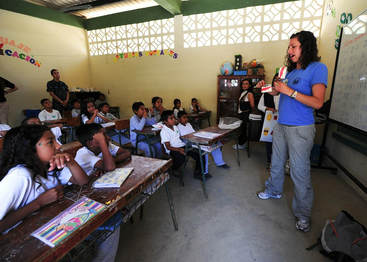How a TEFL Certificate can help you become a better student By Charlotte Leonetti  Although the main purpose in a TEFL course may be for teaching, the course can aid you become a better student as well. A TEFL course provides information about learning styles, techniques, and how to communicate more effectively. The material that you learn in the TEFL course can be beneficial for aspiring teachers but for also students that want to learn ways to become a better student as well. The Teaching English as a Foreign Language (TEFL) Course has multiple benefits – it prepares the aspiring teachers to be able to connect to actual classroom teaching. TEFL is all about the techniques of teaching the skill-based tasks related to listening, reading, speaking and writing. The course itself is a comprehensive compilation of techniques and strategies that are required in day to day teaching process. The course covers the lesson plans and uses techniques that are applicable at all levels of language learning and for all ages-young learners to adults. Beyond the language teaching techniques, the TEFL course also explores classroom management tactics and how to deal with issues related to student management. The students may be adults as well as young learners. All of these topics can help you become a better teacher but also help prepare you to become a better student as well. If you aren’t sure whether you want to be an English teacher in the long run, you might still find that a TEFL course is valuable to you because of how it helps you as a learner. The first important topic the course covers are the three learning styles: kinesthetic, visual, and auditory. Knowing this as a teacher is important, but comprehending this as a student can be very beneficial in the classroom when learning of ways to retain information and material more efficiently. Knowing what type of learning style you have could help you apply techniques that could help you learn and study more effectively. Sometimes just having practiced the skill of teaching a section of content in a variety of ways can help you learn how to better engage with material that you have to learn for class. The course also goes through different techniques that allow you to be effective and confident when it comes to speaking, presenting, and leading the classroom. In addition, learning how to communicate more effectively can also help you in a student role as well when making classroom presentations and communicating in general to the class. Confidence in speaking and preparing presentations comes with practice, and that confidence can help you to get better grades and also just be more comfortable in the classroom. Having seen the classroom from the teacher side, you may find that you are more able to understand the point of activities and that you find it easier to know which materials to study for exams. You also may find it easier to engage with classroom activities or actively participate in asking questions because you have been in the teacher’s shoes before. The best teachers make the best students, because they’ve been on the other side! Additionally, you will learn the skills and qualities that make a good learner, especially when it comes to language learning. By knowing and understanding these characteristics, you are able to take full advantage of the classes you are attending. You will learn how to: work as a team and in a group, hold conversations and communicate more effectively, be observant, stay motivated, take risks in class, among other beneficial qualities. This will help you succeed in your classes, in ways that people without the TEFL certification would not be able to. Regardless of your reasons to take a TEFL course, it opens up a whole new world of opportunities – ways that can be beneficial as a teacher, student, and learner in general. Getting a TEFL Certificate can open up a world of opportunities to you in your current classroom and it can also take you places across the globe!
0 Comments
How a TEFL certificate can help you in other careers and Professions By Charlotte Leonetti  A TEFL certificate is a globally recognized certification to teach the English language as a foreign language. The major purpose of a TEFL Certification is to enable teachers to be capable to instruct non-English speakers in English. Some people believe that getting a TEFL certificate is just helpful for the classroom, but after the certificate or teaching abroad there are numerous skills that are adaptable to future workers regardless of industry. Working as an English teacher abroad can be a really enriching life experience, full of new adventures and excitement. For many people, that alone is the reason is enough to take the plunge. But the experience you get after obtaining a TEFL certificate can also be useful in other major fields as well. To an employer, effective communication is essential no matter what field and obtaining a TEFL certificate is really strong evidence of that skill. Teaching abroad relies on the ability to communicate with people who not only don't speak the same language as you, but also don't share the same culture. After a TEFL course, you’re prepared with improved communication skills and resourcefulness. No matter where you teach, you'll probably have to contend with the same problem teachers everywhere face: lack of funding and materials. In many schools around the world, lack of resources – especially for language classes – is a huge barrier to learning, and it's up to you to make your class work with what you have. Teaching almost anywhere is a huge lesson in making do with what you've got, and potential employers in any field should be able to appreciate the resourcefulness that teaching abroad imparts. After a TEFL course, you will be prepared to manage and to control classes with large numbers of students, and you are provided with specific techniques for managing student behavior in a variety of settings, settings with the most basic resources. A TEFL course shows prospective employers you are capable of effective communication. Almost anywhere you teach in the world, it's likely that you'll be interacting primarily with people who speak a different language and have a different culture than you. Even if you're teaching in a country where English is an official language, your students may have varied levels of written English, and it may be harder to communicate with them than you realize at the beginning. If you don't speak much of the local language, getting a lesson plan across to your students can be even more difficult. That's where your communication skills come in, including the skills you learned to get your TEFL certificate. You don't necessarily have to have the right words or the same culture to teach abroad, but you do have to have the same human awareness. Your success as a teacher will depend on your ability to put your students at ease, and encourage them, and teach them something valuable in spite of your vast differences. You will show a willingness to embrace and overcome challenges. Teaching TEFL is hard work! By getting a TEFL certificate and getting some experience teaching speakers of a foreign language, you will get experience in overcoming a number of challenges. Teaching English to people who don’t speak English requires that you learn to be perceptive of others’ abilities and work to accommodate them. It requires that you be willing to think outside the box and potentially embarrass yourself in order to help your students succeed. It requires that you be comfortable with public speaking, but also be able to listen well. It requires that you be organized, thoughtful, and able to demonstrate attention to detail. It also shows that you are willing to learn new things even if they are challenging. Those are all skills that a potential employer might want! You will have a solid edge over the other candidates who lack TEFL certification. Although the TEFL class is known as a course that allows individuals to teach English, the skills and information you learn are beneficial to many different fields of work and will give you an advantage over competitors. You could well find that spending some time living in another culture is will help boost your career and also boost your confidence, independence and language skills. You may find that whether or not you want to teach English in the long term, a TEFL certification is great way to build new skills and job experience that enhance your career, no matter what field you choose in the end. Do cross-cultural connections matter? By Charlotte Leonetti  In today’s world of globalization, understanding cultural differences has become of vital importance to every organization, whether it be a school, a business, or in your own personal life. In today's increasingly interconnected world, modern means of communication such as social networks and video conferencing mean that we see cultural connections like we never have before and at a higher frequency. A TEFL certification can be a great way to get experience working within and across other cultures and learning how to manage the challenges of doing so. As the world becomes more connected, this experience can prepare you for many careers. Simply put, the practice in communicating effectively and positively with others from another culture to create change (in the case of TEFL, the change would be learning English) is a skill that almost anyone can put to his or her advantage. In business, cultural sensitivity and maintaining a good relationship is vital when managing a deal. Understanding differences between your own cultural and an unfamiliar one can make or break a business deal. Effective communication is key to any organization’s success, and so an appreciation and awareness of different cultures is also of great importance in maintaining a professional environment in the workplace. Organizations today, no matter what kind of organization it is, are a mix of people from different cultural backgrounds who have to understand each other, interact on a daily basis. Therefore, being able to interact with people from different backgrounds and countries is extremely important. Understanding different people’s cultural norms and traditions is crucial when trying to communicate in a correct and appropriate manner. A TEFL course focuses on making sure you understand how to relate the material you are teaching to the culture of your students and adapt to their cultural norms so that you can be respectful while also making sure they learn the material - so it’s perfect practice! With globalization in full swing, there’s a good chance you’ll be working with, studying with, and living among people whose first language is not the English language. Showing sensitivity to cultural differences and being aware of cultures that are unlike your own will help enrich and develop your relationships, whether you’re dealing with clients, customers or colleagues. The experience you will get teaching abroad and being TEFL certified will demonstrate your cultural competence. The TEFL Certificate curriculum covers the following areas when it comes to cultural sensitivity: surface and deep culture, the five barriers to cross-cultural communication, four main cultural dimensions and their implications for the EFL classroom, and culture shock and its stages. In any field, demonstrating your experience navigating, understanding, and thriving in other cultures apart from your own is of the utmost importance. Living and work abroad in another country is an experience that will certainly set you on the right path of pursuing a career in the field of your choice. In addition to your cultural competence, working cross culturally emphasizes teamwork, communication, adaptability and global thinking skills. These are all qualities necessary for working with other cultures in any field, be it in a business, non-profit organization, government, or education setting. Lastly, cross cultural connections matter in order to find out what you are interested in and are important when finding out more about yourself. In making these connections, you are also discovering new activities, art, languages, dances, sports, cooking, and much more. You also may start to explore what aspects of your behavior and personality you thought were naturally part of you but may in fact be mostly from cultural influence - it can be very interesting! As a result of all of these interactions, you are able to find new things that you are passionate about and can bring back to your culture as well. |
Details
AuthorBlogger Charlotte Leonetti has traveled abroad on service trips numerous times and has completed her TEFL certification so that she can better tutor English to students from around the world. Charlotte grew up speaking French & English and knows the importance of learning more than one language. She has spent the last four years learning Mandarin, so she is particularly attuned to the struggles of studying a new language and the value that a great language teacher can offer. Charlotte's website can be found here: www.charlotteleonettiwrites.com/ Archives
September 2017
Categories |
 RSS Feed
RSS Feed